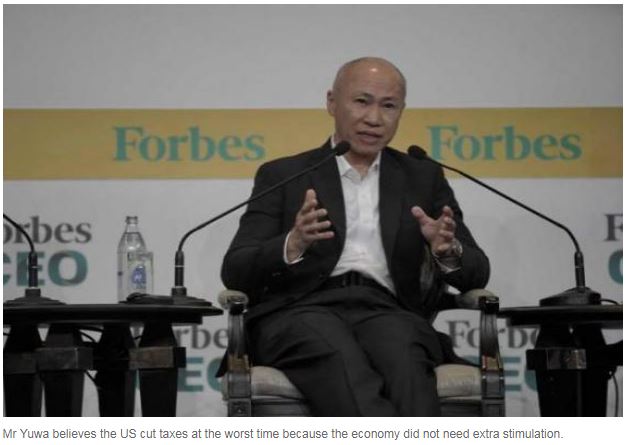Economist: Asean to remain steady during next recession
Thailand and Asean should be particularly resilient during the next recession because of integration and strong fiscal policy, says Yuwa Hedrick-Wong, global economist at Mastercard.
“Thailand is extremely well-positioned for integration across Asean. The country is clearly poised to become a regional hub in terms of services,” he said.
Despite potential economic turmoil caused by the US-China trade war, Thailand and the region can maintain economic stability because of strong currencies, fiscal policy, cooperation and integration.
“Thailand will play a pivotal role in the region. Thai expertise in investments and financial institutions will provide vital ingredients for success in Asean,” said Mr Yuwa.
Unlike the US, which has recently taken a combative approach to global trade, Asean has sought economic cooperation among nations and businesses.
“A fundamental and deep misconception about international trade is that it’s about competition between countries,” he said. “Companies compete, not countries.”
Mr Yuwa said intra-regional trade in Asia is second only to Europe, but unlike Europe, Asia has achieved this without a pan-regional trade agreement. To increase integration further, a common currency, like the euro, should be the last step.
More open borders for skilled workers, freer cross-border operations and a reduction in trade barriers will all help improve what is already strong integration.
“The problem in Europe is a currency union was created without a banking union and it was a complete disaster,” he said. “Asean can learn from this mistake and start with basic, pragmatic changes.”
Asia was able to develop this integration from the bottom up, through cooperation between corporations, with governments playing a minor role, unlike Europe.
A recession probably will not hit for the next 1-1½ years but maybe in 2020, he said. The longer growth business cycle is maintained by the global economy as this has been one of the longest growth cycles in recent times.
Macroeconomic factors are healthy in Asean in terms of growth and currency stabilisation, despite some disruptions to currency valuation like with Indonesia’s rupiah.
“The integration is so massive, dynamic and powerful, if you tap into it, the possibilities are endless,” Mr Yuwa said.
It is difficult for small countries to protect themselves against global economic disruptions, but he sees Thailand as particularly resistant because it has public finances in good order, relatively low debt levels and low currency fluctuation.
Mr Yuwa said Asia learned its lesson well from the 1997 financial crisis and recovered quicker than expected. Thailand was hit hard and took longer than other Asian countries to recover, but bounced back in only 3½ years, despite pundits at the time saying recovery would take 10-20 years.
In the West, however, he believes countries may have a tougher time with a recession because of political instability. The rise of reactionary leaders and political polarisation could make Western nations less prepared to deal with economic crises.
Mr Yuwa said the US cut taxes at the worst time, as the economy did not need to be stimulated when economic growth was already so high.
Source: https://www.bangkokpost.com/business/news/1568846/economist-asean-to-remain-steady-during-next-recession


 English
English




